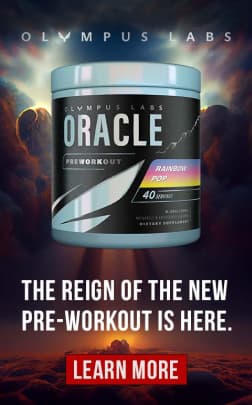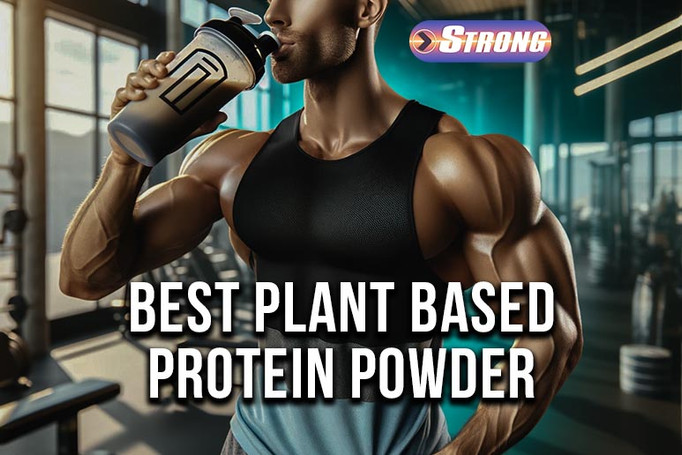Best Plant Based Protein Powder
Posted by Leonard Shemtob on Apr 26, 2024
Are you on the hunt for the best plant-based protein powder to revamp your fitness regime?
Whether you're a seasoned vegan athlete or just trying to avoid animal products, this guide is your one-stop-shop for all things protein.
Dive into the world of plant-based powders and discover how these powerhouse products can transform your health and fitness goals.
Short Summary:
- Exploring one of the top plant-based protein powders on the market.
- Highlighting Vegan Protein and its health benefits and eco-friendly impact.
- A detailed discussion on what plant-based protein is, how it works, and its role in muscle building and overall wellness.
- Comprehensive coverage of the benefits and potential concerns when switching to or starting with vegan protein powders.
- Practical advice on how to effectively use plant-based protein powders to achieve the best results in fitness and health.
- A feature on Select Vegan Protein by PEScience, showcasing its unique ingredients and flavor profiles.
- Buy The Best Plant Based Protein Powder and become part of the sustainable fitness movement!
Related Reads:
What is Plant Based Protein?
Plant-based protein comes from, you guessed it, plants! Unlike traditional whey protein derived from milk, plant-based proteins are extracted from organic plant sources like peas, brown rice, and hemp.
These proteins are not only cruelty-free but also packed with essential amino acids and nutrients for your body.
They are a fantastic option for anyone looking to avoid artificial sweeteners and common allergens found in animal-based proteins.
Importance of Protein Intake
Protein is the building block of muscle – it's essential for muscle repair, growth, and overall strength. But how much protein do you need to consume for best results?
If you're looking to build muscle, aim for about 0.7 to 1 gram of protein per pound of body weight.
For those on a fat loss journey, maintaining high protein intake can help preserve muscle mass while shedding fat. Remember, the right amount can vary based on your activity level and fitness goals, so adjust accordingly!
Plant Based Protein vs Whey Protein
When you're picking out a protein supplement, you'll probably see a few different types including plant-based protein and whey protein. Each has different features, depending on what you're looking for as far as diet, health, and how your body reacts to them.
Where Are These Proteins Sourced From?
Plant-based proteins are made from plants like peas, rice, and soy, which makes them perfect for vegans or vegetarians. Whey protein comes from milk as a by-product during the process of making cheese.
Protein Quality
Whey protein has all the essential amino acids your body needs, which makes it a "complete protein." Most plant-based proteins need to be mixed with other types to get all these amino acids, except for soy, which is also complete.
How Your Body Uses Them
Your body absorbs whey protein fast, which is great after a workout to help muscles recover. Plant-based proteins are a bit slower to digest, but they are usually easier on your stomach. This is especially beneficial if you're lactose intolerant or have trouble with dairy.
What's Inside?
Whey protein typically has more protein per scoop and contains lots of BCAAs (important for muscle growth). Plant-based proteins might have less protein but are often packed with other good stuff like fiber, vitamins, and minerals.
Health Benefits
Plant-based proteins can help with improving certain things such as heart health. They may also be better for your kidneys because they have less cholesterol and saturated fat. Whey protein is excellent for building muscle and recovery because of its protein and amino acid content.
Impact on the Environment
Making plant-based protein usually uses less water and land and creates fewer greenhouse gases than making whey protein. This makes plant based proteins overall better for the planet.
Taste and Texture
Whey protein is known for mixing well and coming in many tasty flavors. Plant-based proteins have gotten a lot better in taste and texture, but they might still feel a bit grainy or have a stronger taste from the plants they're made from.
Both types of protein have their perks, and the best choice for you depends on your health needs, how you want to impact the environment, and what your stomach can handle. Just make sure whatever you choose consists of good quality ingredients and fits your body’s needs.
Benefits and Concerns of Plant-Based Protein Powders
Here are the benefits and potential drawbacks of using Plant-Based Protein supplements
Benefits Provided By Plant Based Protein:
- Allergy-friendly: Most are gluten-free and free from dairy, making them great for those with allergies.
- Environmentally sustainable: Less resource-intensive than animal-based proteins.
- Rich in nutrients: Often fortified with vitamins and include ingredients like greens blends and branched chain amino acids.
- Gut health support: Many plant-based proteins are high in fiber. This promotes digestive health and supports a healthy gut environment.
- Low in fat and calories: Typically lower in calories and fats compared to animal-based proteins. This makes them a healthy option for those looking for some extra help in managing their weight.
- Free from hormones and antibiotics: Unlike some animal-based proteins, plant-based proteins do not contain hormones or antibiotics. This is usually a common concern for health-conscious consumers.
Potential Drawbacks or Concerns:
- Protein quality: Some plant proteins may lack one or more essential amino acids.
- Taste and texture: Some users may notice that the texture is somewhat gritty or find the flavor is not as sweet.
Proper Use of Plant Based Protein for Best Results
To maximize the benefits of plant-based protein powders, consider the following tips:
- Timing: Consuming protein shakes within 30 minutes after a workout can help optimize muscle repair.
- Mixing: Blend with peanut butter, oats, fruits, or a greens blend for a nutritious smoothie.
- Consistency: Regular intake is key in supporting muscle growth and repair.
Best Plant-Based Protein Powder
Here’s a detailed look at our top-ranking plant-based protein powder. This option has been meticulously crafted to enhance your nutrition and support your goals with premium ingredients.
Select Vegan Protein by PEScience
Select Vegan Protein by PEScience is a top-tier choice for anyone serious about their health and fitness. This vegan protein powder stands out because of its high-quality blend of pea and brown rice proteins for a complete amino acid profile. Furthermore, it's entirely free from artificial sweeteners, using only natural flavors for a clean and pure taste.
Key Ingredients:
- Pea Protein: Rich in branched chain amino acids, great for muscle building.
- Brown Rice Protein: Helps to enhance the protein’s overall amino acid profile.
- Monk Fruit: Provides natural sweetness without the need for artificial additives.
Macro Ratios & Supplement Facts
Each 1 scoop serving contains:
- 120 calories
- 20 grams protein
- 1 gram of total fat
- 5 grams carbohyrates
- 0 grams sugar
- 140 mg sodium
Provided Benefits:
- Supports Muscle Growth: Provides all essential amino acids required for muscle repair.
- Boosts Metabolic Health: Formulated to support a healthy metabolism, helping you burn calories more efficiently.
- Rich in Plant-Based Nutrients: Packed with naturally occurring vitamins and minerals that support overall health and vitality.
- Supports Recovery: Contains ingredients that help reduce muscle soreness and speed up recovery time after workouts.
- Low in Allergens: Free from major allergens, making it suitable for individuals with sensitive diets.
- Sustainable Source: Made from environmentally sustainable plant sources, aligning with eco-conscious dietary choices.
- Easily Digestible: Gentle on the stomach and easy for the body to absorb.
- No Artificial Sweeteners: Ideal for maintaining a clean diet.
Tasty Flavor Options:
- Chocolate Peanut Butter: A rich, creamy blend of deep chocolate and smooth peanut butter.
- Cinnamon Delight: Warm cinnamon swirls in every sip, perfect for a comforting treat.
- Peanut Butter Delight: For the peanut butter lovers, this flavor is both bold and satisfying.
- Vanilla Indulgence: Your traditional smooth and creamy vanilla that’s both lush and velvety.
- Chocolate Bliss: Decadent chocolate that satisfies your sweet tooth in a healthy way.
To Wrap Things Up
Ready to take your fitness to the next level with the best plant-based protein powder on the market? Select Vegan Protein by PEScience is not just a supplement; it's a game changer for those who lead a plant-based lifestyle.
Packed with high-quality ingredients and delicious flavors, it's perfect for anyone looking to enhance their diet. Don’t just take our word for it, try it out and experience the phenomenal benefits of plant-based protein yourself!
Written and Sponsored by Leonard Shemtob
Leonard Shemtob is President of Strong Supplements and a published author. Leonard has been in the supplement space for over 20 years, specializing in fitness supplements and nutrition. Leonard appears on many podcasts, written over 100 articles about supplements and has studied nutrition, supplementation and bodybuilding.
Leonard's articles have been published in many top publications around the web. Leonard enjoys weight training, playing basketball and yoga, and also enjoys hiking. In his free time he studies and works on improving himself. For more detailed information, visit his official blog.
Plant Based Protein Powder FAQs
Related Articles
Read More About Protein & Building Muscle

- Łuszczki, E., Boakye, F., Zielińska, M., Dereń, K., Bartosiewicz, A., Oleksy, Ł., & Stolarczyk, A. (2023). Vegan diet: nutritional components, implementation, and effects on adults' health. Frontiers in nutrition, 10, 1294497.
- Mariotti, F., & Gardner, C. D. (2019). Dietary Protein and Amino Acids in Vegetarian Diets-A Review. Nutrients, 11(11), 2661.
- Kim, H., Caulfield, L. E., & Rebholz, C. M. (2018). Healthy Plant-Based Diets Are Associated with Lower Risk of All-Cause Mortality in US Adults. The Journal of nutrition, 148(4), 624–631.


